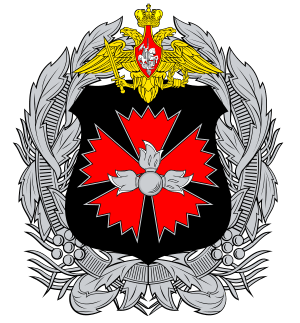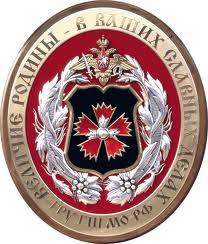GRU facts for kids

Badge of the Glavnoje Razvedyvatel'noje Upravlenije
|
|
| Agency overview | |
|---|---|
| Formed | November 5, 1918, GRU since 1942 |
| Preceding agency |
|
| Jurisdiction | President of Russia |
| Headquarters | Khoroshevskoye shosse 76, Khodinka, Moscow 55°46′49.41″N 37°31′21.51″E / 55.7803917°N 37.5226417°E |
| Agency executive |
|
| Parent agency | Russian Ministry of Defense |
| Website | Official Page: http://www.structure.mil.ru/structure/ministry_of_defence/details.htm?id=9711@egOrganization |
The GRU is a special group that gathers information for the Russian Federation's military. It used to be part of the Red Army in the Soviet Union.
"GRU" is an English way to say the Russian acronym ГРУ. An acronym is a short word made from the first letters of other words. In Russian, it stands for Main Intelligence Directorate.
The GRU is Russia's biggest foreign intelligence group. In 1997, it had many more agents working in other countries than the SVR. The SVR is another Russian intelligence agency. The GRU also had about 25,000 special troops called Spetsnaz in 1997.
Contents
The GRU's Beginnings
The GRU started a long time ago. Its first version in Russia was created on October 21, 1918. This was after the time of the Tsars (Russian emperors). Leon Trotsky, who was in charge of the Red Army, helped create it.
At first, it was called the Registration Directorate, or Registrupravlenie in Russian. In 1921, it became the Second (Intelligence) Directorate of the Red Army Staff.
What the GRU Does
The GRU's main job was to collect military information. This included important military or political facts from outside the Soviet Union. The GRU had offices, called "residencies," all over the world.
They also used SIGINT, which means signals intelligence. This is when they listen to or read electronic signals like radio messages. They did this in places like Cuba and countries that were part of the old Soviet Union, such as Lithuania, Latvia, and Estonia.
GRU's Independence and Rivalries
The GRU was known for being very independent. It didn't like other Russian intelligence groups telling it what to do. These other groups included the NKVD and the KGB.
When the GRU was first made, the leader, Lenin, told the Cheka (an early version of the KGB) not to get in the GRU's way. But the Cheka still managed to get its own agents inside the GRU in 1919. This started a big rivalry between the two groups. Both were trying to gather secrets. This rivalry was even stronger than the one between the FBI and CIA in the United States.
GRU in the Public Eye
For a long time, the GRU's existence was kept secret in the Soviet Union. People in Western countries started to learn about it in the late 1920s. An early defector, Georges Agabekov, mentioned it in his book in 1931. Walter Krivitsky, a high-ranking Red Army intelligence officer who left the Soviet Union, wrote a lot about it in his book in 1939.
The GRU became widely known in Russia and the West during a time called perestroika. This was a period of big changes in the Soviet Union. "Viktor Suvorov" (Vladimir Rezun), a GRU agent who moved to Great Britain in 1978, wrote books about his time in the Soviet military and intelligence services. He even said that the top leader of the Communist Party couldn't enter GRU headquarters without special security checks.
The GRU Today
The GRU is still a very important part of Russia's intelligence services. It was never broken up like the KGB was. The KGB was dissolved after it helped with a failed attempt to take power (a coup) in 1991. This coup was against the Soviet President at the time, Mikhail Gorbachev. After that, the KGB was split into two new agencies: the Foreign Intelligence Service (SVR) and the Federal Security Service (FSB).
The GRU was officially dissolved on May 7, 1992. However, it continues to operate as the Main Intelligence Directorate of the Russian Armed Forces.
Images for kids
-
6th GRU chief Igor Korobov (right) and Defence Minister Sergey Shoigu in February 2016
-
Wreath laying ceremony for past GRU agents
-
5th GRU chief Igor Sergun with Defence Minister Sergey Shoigu and Chief of the General Staff Valery Gerasimov
See also
 In Spanish: GRU para niños
In Spanish: GRU para niños
 | Janet Taylor Pickett |
 | Synthia Saint James |
 | Howardena Pindell |
 | Faith Ringgold |












